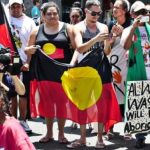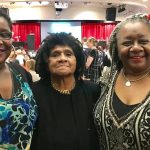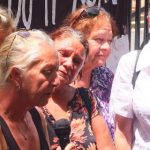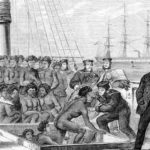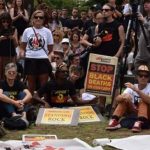Australia Day: Patriots, Politicians and Changing the Date
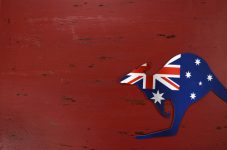
The push to change Australia’s national day is gaining momentum, and many feel today will be the last time January 26 will be referred to as Australia day.
However, it seems there are some Anglo Australians that still need the reasons spelt out as to why this change is necessary.
Today marks 230 years since the British began their occupation of this continent. For the First Nations peoples of this land, January 26 is the date that signifies the beginning of violent dispossession and ongoing cultural atrocities.
From 1788 onwards, Europeans took over the lands of the Aboriginal and Torres Strait Islander peoples, whilst they perpetrated heinous massacres well into the 1900s. While the often unacknowledged Frontier Wars waged on between the locals and invaders, whole Nations were wiped from the face of the earth.
During the seventy years that followed federation, these events were written out of the history books, in what became known as the Great Australian Silence.
However, the history was hardly lost upon First Nations peoples.
To this day
While some in the community claim these transgressions took place hundreds of years ago, that’s far from the truth. In fact, the Frontier Wars continued right up until 1934.
Known as the Stolen Generation, the practice of removing children from Indigenous families began early last century and continued up until the late 1960s. However, the forced removal of First Nations children continues on unabated today, under the auspices of community services.
The overrepresentation of Indigenous people in this nation’s prison system beggars belief. Aboriginal and Torres Strait Islander people make up 28 percent of the Australian adult prisoner population, whilst only accounting for 3 percent of the country’s overall populace.
And Indigenous youth suicide rates in Australia are amongst the highest in the world.
Never ceded
According to the People’s Council of the Murrawarri Republic, there were only three legally recognised doctrines that governed the taking over or acquiring of new land under 18th century British law.
These were a declaration of war, the negotiation of a treaty or the principle of terra nullius: the concept that the land had no owners.
The British never officially declared war on the continent’s Indigenous nations, and neither has a treaty ever been established.
Great Britain claimed it acquired the land as it was terra nullius, despite the fact the local people were living here at the time. This legal fiction was finally overturned by the High Court of Australia in its 1992 Mabo versus Queensland (No 2) ruling.
Situated on the border of NSW and Queensland, the Murrawarri Republic made a formal declaration of independence on March 30 2013. The Murrawarri people pointed out that they’ve been living on their land for tens of thousands of years, and sovereignty has never been ceded.
And these days, the only person who seems to be clinging onto the concept of terra nullius is former prime minister Tony Abbott.
Backlash over mourning proposal
Victorian Greens MP Lidia Thorpe recently suggested that flags should be flown at half-mast on January 26 to recognise “the grief and suffering” of First Nations peoples. Her comments came as the Australian Greens launched their Change the Date campaign.
The first Aboriginal woman to have been elected into Victorian state parliament, Ms Thorpe told Sydney Criminal Lawyers® last month that “the only way we can move forward and heal as a country – and a united front – is to acknowledge” its true history.
And she further explained that changing the date would be one way of making this acknowledgement.
However, Ms Thorpe received a series of death threats due to her flag suggestion. This included an incident where police were alerted after a man tried to enter her Northcote electorate office. He subsequently slid a note under the door, stating that all black people should be killed.
In response to the threats, Ms Thorpe took to social media tweeting that she’d respectfully asked to have a conversation about lowering the flags. And she further wrote, “I know that we are mature enough as a nation to confront our past while walking towards a shared future.”
Grasping at straws
A recent Australia Institute poll found that the majority of Australians don’t care if the national holiday changed to another date. And it seems that much of the outcry against the date change proposal comes from far-right white nationalist groups.
Last September, members of the United Patriots Front stormed a City of Yarra meeting, after the council had previously voted to scrap its Australia Day citizenship ceremony, and replace it with an event to mark Indigenous culture.
While, around 50 members of Reclaim Australia held a rally in Fremantle on January 26 last year, to protest the local council’s cancellation of Australia Day events.
Fremantle council instead held a culturally inclusive day of celebrations two days later.
A misguided concept
In January last year, so-called patriots took offence to a billboard promoting Australia day that featured two girls wearing hijab.
The United Patriots Front posted the image to Facebook and wrote, “they’re making every effort to redefine your nation and gradually erase you from history.”
But, rather than expressing any true reality now, this sentiment more accurately describes the British colonial takeover of this continent.
Indeed, these far-right nationalists are holding onto a notion of “white Australia” that doesn’t exist at present, and never really existed in the past. And the land they propose to reclaim was actually stolen from Aboriginal and Torres Strait Islander peoples.
Out of touch
Of course, no one is really surprised that Tony Abbott is still calling for the date to remain the same. The former prime minister told 2GB on Monday that he believes “what happened on 26 January 1788 was, on balance, for everyone – Aboriginal people included – a good thing.”
And in hearkening back to 19th century “white man’s burden” rhetoric, he said, this is “because it brought western civilisation to this country.”
Current PM Malcolm Turnbull said last year that to change the date was to turn one’s back on Australian values. And more recently he stated that changing it was not the right way to redress what has happened to the nation’s First Peoples.
The minister for Indigenous affairs
And perhaps most curious of all, Nigel Scullion, the minister the government has charged with the Indigenous affairs portfolio, stated on ABC radio last Friday that no Aboriginal or Torres Strait Islander person has ever told him that they want the date changed.
Although, he said the subject might come up whilst he was engaged in conversation around “the tea trolley.”
The minister then went onto note that “we have” NAIDOC Week, Sorry Day, Reconciliation Week, and Mabo Day. And in reference to changing the date, he stated, “if you want to divide the nation this is how we go down that line.”
A civil rights gathering
However, it seems the nation will remain divided as long as the date stays the same. And this reaction against celebrating January 26 as a national day is nothing new. It’s actually been going on for at least 130 years.
In 1888, when the colonial capitals celebrated the centenary of British arrival, Indigenous people boycotted these events. But, this went widely unpublicised.
So, in 1938, Sydney’s Aborigines Progressive Association organised a Day of Mourning protest, which was the first such rally acknowledging that January 26 marks the day that the British began their invasion of local Indigenous nations.



